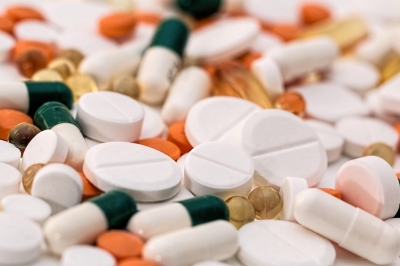Health/medicine
Study finds 2,000 genetic signals that influence blood pressure
London, April 30 (IANS) An international team of researchers has identified 2,000 independent genetic signals, including 113 new regions of the human genome that appear to influence a person’s blood pressure.
The study, based on data from over 1 million individuals and published in the journal Nature Genetics, demonstrates that blood pressure is a highly complex trait influenced by thousands of different genetic variants.
“We have now revealed a much larger proportion of the genetic contribution of blood pressure than was previously known,” said Helen Warren, Senior Lecturer in Statistical Genetics at Queen Mary University of London.
“We are making our polygenic risk scores data publicly available. There are many different potential applications of genetic risk scores, so it will be exciting to see how our blood pressure scores can be used to address more clinically relevant questions in the future,” she added.
For the study, the team combined four large datasets from genome-wide association studies (GWAS) of blood pressure and hypertension.
The additional genomic locations also explain a much larger part of the genetic differences in people’s hypertension levels, the researchers said.
The findings could lead to potential new drug targets, and help to advance precision medicine in the early detection and prevention of hypertension (high blood pressure) — a significant global burden increasing the risk of cardiovascular diseases.
–IANS
rvt/vd
Health/medicine
Biocon Biologics gets US FDA nod for biosimilar version of eye treatment drug Eylea


Bengaluru, May 21 (IANS) Biocon Biologics said on Tuesday that the US Food and Drug Administration (US FDA) has approved the company’s first-to-file application for Yesafili, a biosimilar drug for treating eye ailments.
The company said the medicine is similar to the reference product Eylea (aflibercept) intended for the treatment of neovascular age-related macular degeneration (AMD), visual impairment due to macular oedema secondary to retinal vein occlusion, visual impairment due to diabetic macular oedema and visual impairment due to myopic choroidal neovascularisation. Studies demonstrate that Yesafili matches Eylea in quality, safety, and efficacy, it added.
“The FDA approval of Yesafili (aflibercept) as the first interchangeable biological product to Eylea is a significant milestone for Biocon Biologics, marking our entry into ophthalmology, a new therapeutic area in the United States. This approval builds on our successful track record of bringing the first interchangeable insulin, Semglee, the first biosimilar trastuzumab, Ogivri, and the first biosimilar pegfilgrastim, Fulphila, to patients in the United States,” said Shreehas Tambe, chief executive officer and managing director, Biocon Biologics.
In the US, 19.8 million people live with AMD. In 2023, sales of aflibercept, a common treatment for AMD, were valued at around $5.89 billion, the statement added.
–IANS
sps/uk
Health/medicine
UK infected blood scandal 'could largely have been avoided': Inquiry report


London, May 21 (IANS) A contaminated blood scandal in the UK, which has caused more than 3,000 deaths, “could largely, though not entirely, have been avoided,” according to the inquiry report on the scandal.
The report said on Monday that “a catalogue of failures” by successive governments and doctors caused the “calamity,” in which tens of thousands of patients with haemophilia and other bleeding disorders were infected with HIV and hepatitis viruses after receiving infected blood and blood products between the 1970s and early 1990s, Xinhua news agency reported.
“It may also be surprising that the questions why so many deaths and infections occurred have not had answers before now,” the report added.
The scandal has been called “the worst treatment disaster” in the history of Britain’s National Health Service (NHS).
The report also revealed that there has been “a hiding of much of the truth” by the government and the NHS “to save face and to save expense”.
Such a cover-up was “not in the sense of a handful of people plotting in an orchestrated conspiracy to mislead, but in a way that was more subtle, more pervasive and more chilling in its implications,” it said.
The scandal was linked to supplies of a clotting factor imported from the US, which used blood from high-risk paid donors.
The government announced the establishment of a UK-wide public inquiry in 2017 to examine the circumstances that led to individuals being given contaminated blood and blood products.
In 2022, the government made interim compensation payments of 100,000 British pounds (about $127,000) to about 4,000 infected individuals and bereaved partners who were registered with the country’s infected blood support schemes.
–IANS
int/khz
Health/medicine
US FDA gives nod to Musk's Neuralink to implant brain chip in 2nd person


New Delhi, May 20 (IANS) Tesla CEO Elon Musk-run brain-computer interface company Neuralink has reportedly received a nod from the US Food and Drug Administration (FDA) to implant its brain chip in a second person.
The approval for the second person to have a Neuralink chip came as the first recipient — Noland Armagh in the US — detailed his emotional journey.
The latest chip in the second recipient comes with some fixes, like embedding some of the device’s ultrathin wires deeper into the brain, The Wall Street Journal reported on Monday.
Musk or Neuralink were yet to officially react to the development.
The Neuralink chip can help restore full body control in people suffering from paralysis. The company earlier achieved a successful brain-chip implant with Armagh and began the applications for the second participant for the chip implant.
According to Musk, the company can bridge “severed nerve signals to a second Neuralink in the spine, restoring full body control”.
With the chip in his brain, Arbaugh has enabled “telepathic control of a computer or phone just by thinking”. The Neuralink trials aim to assess the initial functionality of the wireless brain-computer interface for enabling people with paralysis to control external devices with their thoughts.
–IANS
na/vd
Health/medicine
Delhi HC dismisses PIL seeking directions to medical professionals to reveal side effects of medicines


New Delhi, May 20 (IANS) The Delhi High Court has dismissed a public interest litigation (PIL) seeking a direction to all medical professionals to provide an additional slip detailing possible risks and side effects associated with prescribed medicines.
A Bench, headed by Acting Chief Justice Manmohan, said that since the legislature, in its wisdom, has elected to impose this duty on the manufacturer and the pharmacist, it would “amount to judicial legislation” if a direction is issued as prayed for in the PIL.
“It is admitted that there is no (legal) vacuum, the directions prayed for cannot be issued. Accordingly, the present PIL along with applications is dismissed,” the bench, also comprising Justice Manmeet Pritam Singh Arora, ordered.
The PIL said that the patient has a right to make an informed choice and therefore, it should be mandatory for the doctor prescribing the drug to explain the side effects and possible risks attached to the prescribed drugs.
It added that upon being made aware of the side effects of the drug being prescribed by the doctor, the patient would be able to make an informed choice, whether to consume it or not.
Referring to the existing regime, where the obligation to communicate the potential risks and side effects exists on the manufacturer and the pharmacists, the plea said that it is the medical practitioner prescribing the drug, who should be made responsible for handing out the information about the potential risk to the patient in the regional language.
In its response, the Union government stated that the Drugs and Cosmetics Act, 1945 and the Pharmacy Practice Regulations, 2015 already ensure that the risk is duly communicated to the patient, adding that the direction sought would hinder rather than facilitate medical advice to the patients.
–IANS
pds/vd
Health/medicine
178-yr-old practice of distributing ‘fish prasadam’ in Hyderabad to be on June 8-9


Hyderabad, May 20 (IANS) Bathini family will distribute ‘fish prasadam’ to people suffering from asthma and other respiratory ailments here on June 8-9. The family announced on Monday that the annual event will begin at 11 a.m. on June 8 at Exhibitions Grounds, Nampally, and will continue till 11 a.m. on June 9.
Bathini Vishwanatham Goud, president, Bathini Mrigasira Trust, told media persons that they are making all arrangements for the distribution of fish prasadam.
Asthma patients from various parts of Telugu states and other places in the country take this prasadam in June every year in the hope of finding relief from respiratory problems.
The family requested concerned government departments to make arrangements like every year for the smooth conduct of the event.
This will be the first event after the death of the head of the family, Bathini Harinath Goud. He passed away at the age of 84 in June last year, following prolonged illness.
He was the last of the fourth-generation Gouds distributing free fish medicine to asthma patients from across the country.
Harinath Goud was instrumental in organising the event for the last three decades after the demise of his elder brothers.
The Bathini Goud family claims to have been distributing this medicine free of cost for the last 178 years. The secret formula for the herbal medicine was given to their ancestor in 1845 by a saint after he took an oath that it would be administered free of cost.
Members of the Bathini Goud family administer the ‘wonder drug’ on ‘Mrigasira Karti’, (during the first week of June) which heralds the onset of the monsoon.
A yellow colour herbal paste prepared by the family is placed in the mouth of a live ‘murrel’ fingerling, which is then slipped through the throat of the patient. It is believed to provide much-needed relief if taken for three consecutive years. For vegetarians, the family gives medicine with jaggery.
Asthma patients from various parts of the country flock to Hyderabad to take this treatment. However, the medicine lost its popularity during the last 15 years due to controversies pertaining to the contents of herbal paste.
Some groups working to inculcate scientific temper among people, termed the fish medicine a fraud. They also approached the court, claiming that since the herbal paste contains heavy metals, it can cause serious health problems.
However, Goud family claims that the tests in laboratories conducted as per court orders revealed that the herbal paste is safe.
After the challenge by the rationalists, the family started calling it ‘fish prasadam’.
Despite the controversies, people continue to throng the venue every year in hope of finding some relief to their nagging respiratory problems. However, the numbers have dwindled over the years.
–IANS
ms/kvd
-
Video1 year ago
PM Modi Attacks Congress in Karnataka with “Kerala Story”
-
Cricket12 months ago
CSK players rejoice 5th IPL title with their families (Pics)
-
Politics1 year ago
Siddaramaiah & DK Shivakumar sworn in as Chief Minister & Deputy CM respectively
-
Entertainment11 months ago
Karan Deol weds his longtime Girlfriend Drisha Acharya (Pics)
-
Entertainment1 year ago
Urvashi Rautela dazzles on Cannes 2023 red carpet (Pics)
-
Entertainment12 months ago
Sunny Leone gets ready for Kennedy premiere in Cannes (Pics)
-
Entertainment1 year ago
Alia Bhatt looks crazy beautiful in Prabal Gurung creation at MET GALA 2023 (Pics)
-
Cricket1 year ago
Sakshi & Ziva Dhoni enjoy their time during CSK VS MI match
































